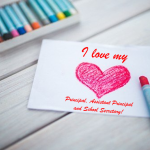Know Yourself to Lead Others
Guest Blog Post by Steve Samuel
We are in the people business which means emotional intelligence is a skill that we use consistently in our schools. Whether working with students, parents, or educators, school leaders use their emotional intelligence thousands of times everyday.
So what is it and how do we cultivate it? Even experts have a tough time nailing down exactly what it is. Dr. Travis Bradberry, Co Author of “Emotional Intelligence 2.0” defines it this way, “Emotional intelligence is the “something” in each of us that is a bit intangible. It affects how we manage behavior, navigate social complexities, and make personal decisions that achieve positive results.” I don’t know about you, but if I sit back and analyze how I spend my time each day, a large portion of what I do could be categorized as managing behavior and navigating social complexities to achieve positive results!
How do we continue to strengthen and refine this skill?
Self Awareness -It starts with being self aware. It is no secret that we have a great responsibility as educators to act as a calming influence as we work with students, staff, and parents, but this can’t be achieved if we aren’t aware of our mood and how our approach will impact each situation we work through.
Stay positive – Positivity is contagious, focus on the things within your control and avoid getting bogged down in things that are not. Find positive settings to balance out less than uplifting interactions; talk with a student who has turned things around, visit a classroom deeply engaged in learning, write a positive note, or make a positive phone call home.
Be Empathetic – Empathy is what makes emotional intelligence work. The more we put ourselves in someone else’s shoes the more trust we can build with them. When it is clear we have a genuine interest in how others feel, positive outcomes are much more likely.
Do things that make you happy – Carve out time to focus completely on the things that make you happiest. Disengaging from the daily grind and focusing on these items keeps us fresh and prepared to tackle the challenges we face as educators.




